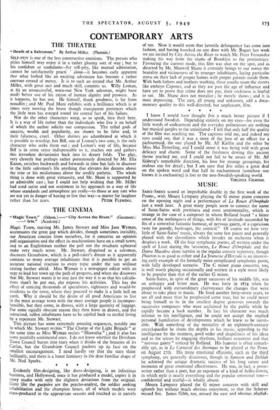CONTEMPORARY ARTS
THE THEATRE
"Death of a Salesman." By Arthur Miller. (Phoenix.) SELF-PITY is one of the less constructive emotions. The person who pities himself may enjoy it in a rather gloomy sort of way ; but to his confidant or confidante—for self-pity, like mutual admiration, cannot be satisfactorily practi ' alone—it becomes early apparent that what looked like an exciting adventure has become a rather onerous errand of mercy. It is to such an errand that Mr. Arthur Miller, with great tact and much skill, commits us. Willy Loman, at 63 an unsuccessful, worn-out New York salesman, might have made better use of his ration of human dignity and prowess. As it happens, he has not. He himself, thank goodness, is far from maudlin ; and Mr. Paul Muni exhibits with a brilliance which is at times very moving the brave though transparent pretences which the little man has erected round the central fact of his failure.
Nor do the other characters weep, so to speak, into their beer. It is a way of life rather than the individuals who live it on behalf of which the author solicits our compassion. The tribal gods of success, wealth and popularity, are shown to be false and, in their falseness, cruel. Other shrines are adumbrated at which it is possible to worship, but Biff, one of Loman's two sons, is the only character who seeks them out ; and Loman's way of life, because Biff is in some sense indispensable to it, reaches out and gathers this irresolute deviationist back into its dreary folds. The play, very cleverly but perhaps rather portentously directed by Mr. Elia Kazan, switches backwards and forwards in time but fails to discover in the little salesman's life anything that elevates his dreams above the trite or his misfortunes above the seedily pathetic. The whole thing is done with great virtuosity, and Mr. Muni is supported by an admirable cast ; but I could not help wishing that Mr. Miller had used satire and not sentiment in his approach to a way of life whose standards and atmosphere are really—to those at any rate who are not yet in danger of having to live that way—a matter for laughter


































 Previous page
Previous page